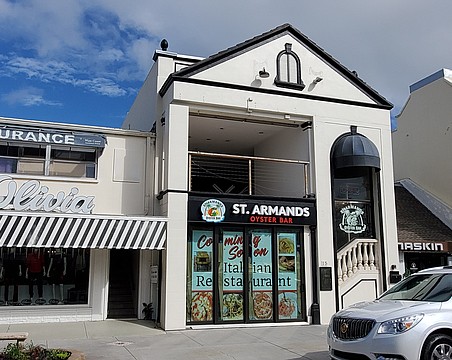Face off
BANKING by Dave Szymanski | Tampa Bay Editor
The softer economy has put pressure on banks and credit unions to grow their business, which is similar and embattled.
Alex Sanchez wants to know why multi-billion dollar, multi-county credit unions in Florida pay no state or federal income tax and do less paperwork than banks yet continue to offer the same services as banks do.
"Why should a family of four pay more tax than a $1 billion credit union?" Sanchez asks.
Tom Dorety has an answer: Credit Unions are nonprofits and serve their members, not investors. They actually have just as much paperwork as banks and they're been offering commercial loans and other services for years. Banks still do more than 90% of loans.
Sanchez is the chief executive officer of the Florida Bankers Association, which represents the state's 335 banks. Dorety is president and chief executive officer of Suncoast Schools Federal Credit Union in Tampa and is chairman of the board for the Credit Union National Association. There are 191 credit unions in Florida, including 35 on the Gulf Coast. Florida is fifth in the nation in credit union assets.
Despite their differences in structure, there are some similarities between banks and credit unions. Both are in consolidation modes. Both have been hurt by the economy. Both like to talk about the value of local communities. And both are talking to the federal government about some changes to help their industries.
Economy and community
What's more, both banks and credit unions in Florida have been hurt from fewer people and businesses seeking loans and tougher times for their customers.
After consecutive years of high profits, banks are having trouble growing their deposits. Credit unions have felt the slowdown too, as their members are making less and have less value in their homes, Dorety says.
"We make loans to people who have home equity loans, and their hours are reduced," Dorety says. "Our members are working people for the most part. This is a recession that's affecting them directly. People are struggling now."
Yet Sanchez said Florida is better positioned than other states to get out of the recession.
"Now, were in a more challenging cycle," Sanchez says. "Some people forget we were in a cycle before. There's a correction now, tied to home prices and the value of land."
"Some people hear we bottomed out," he adds. "But Florida will continue to have this growth. We're still up versus Ohio and Michigan."
Rising unemployment, loss of income and significant devaluation of properties have hurt credit union members.
"One of our immediate challenges is to make sure our members have the ability to repay debts and live effectively," Dorety says. "Florida's west coast is one of the hardest hit areas for the rise in unemployment and loss of value in property."
Sanchez says bankers want to make sure Florida has a good business climate, with clean industries that continue to attract companies and jobs.
Tied to that, bankers want strong, safe communities.
"Bankers are leaders in the community," Sanchez says. "They know a lot about the community."
Federal rules
One issue affecting credit unions and banks is a bill in the House and Senate that would raise the cap on credit unions so they could use 20% of their assets to make commercial loans. The cap is now 12.25%.
Dorety testified before Congress in March on the issue. The bills have 150 co-sponsors.
Although banks oppose the bill, credit unions have been making commercial loans for years. They actually make less than 1% of all commercial loans, Dorety notes.
"Right now it's almost impossible to get anything done in Washington because the election-year politics," he says.
Banks are questioning the federal government about the burden of regulation. After 9-11, Congress passed the Patriot Act, which forced banks to file a lot more paperwork with the federal government.
But the amount of extra work has many banks wondering about the outcome of investigations.
"We want to catch the bad guys, too," Sanchez says. "Bankers are filing a lot of documents. What are the results of our efforts? There's not a more patriotic group than bankers. (But) we want to know what the results are."
Credit unions also have their share of paperwork.
"We are heavily regulated, just as much as banks," Dorety says. "There is more than enough to do. The comparison is irrelevant."
Organizations, taxes
Sanchez has a staff of 25 in Tallahassee. The bankers association is 120 years old.
The association represents all banks in Florida. Sanchez goes to Washington once a month to lobby legislators. The state and national efforts are tied to local results, he says. The stronger the community, the more opportunities for the bank.
"Our bankers are so involved in the community," Sanchez says. "As the communities grow, so do our banks. Chances are the small business owner got the loan at the bank."
The Florida Credit Union League has a staff in Tallahassee that advocates for its industry as well. And as banks have grown in size, so have some credit unions.
"The organizations themselves, in terms of current financial difficulties, are in reasonably good shape," Dorety says. "They are well-capitalized. There are no bail outs. They were not involved in any sub-prime exotic products. Credit unions are reasonably well, but not as well as last year."
Like banks, credit unions are going through consolidation.
"We're not immune to what's going on," Dorety says. "Credit unions aren't different from other institutions. There's not creation of a lot of new credit unions. Banks are formed for investors to make money. The focus is to build it up."
With credit unions, there's no profit motive, however, the difficulty they face is that they can't raise capital other than through their own operations.
To find new members, some credit unions have gone into new and underserved areas, such as east Hillsborough County or Immokalee in Collier County.
However, because credit unions don't have to answer to investors every quarter, Dorety says the industry should attract more members.
"People will appreciate that our strategies and goals are focused on them," he says.
Dorety says the lack of local owership of some banks may also help credit unions.
"Suncoast is headquartered on the west coast of Florida," he says. "The banks are based in Charlotte, Birmingham and Atlanta. Credit unions are community financial institutions. We make decisions here to impact our community. This ownership phenomenon has changed the equation.
Tax issue
Despite the difference in structure, as some credit unions climb in size and offer more services, banks question their tax-exempt status.
"One of our concerns is credit unions," Sanchez says. "Leave the mom-and-pop credit unions alone. The issue is tax-exempt status. Credit unions like Suncoast and Grow (Grow Financial Federal Credit Union in Tampa), they are tax-exempt banks masquerading as credit unions. They don't pay Florida or federal income tax. When the public learns this, they will be outraged. Suncoast is in 21 counties."
Dorety says the public does know and is not outraged because the structure of credit unions and banks is different.
Where credit unions are non-profit and serve their members, banks, many of which are based out of state, are serving their investors first, not their customers, Dorety notes.
Congress reaffirmed the credit union industry's tax-exempt status, because of its not-for-profit status, as recently as 1998.
"The $6 billion Suncoast Credit Union is operated exactly the same - where the money goes - when we were $6 million," Dorety says. "We have a volunteer board. They act in the best interests of members. That's why there's a tax exemption. The ownership structure."
Banks don't like competition, Dorety says.
"Banks, up until recently, the past six or seven years, had record profits," he says. "Credit unions have 6% of the financial services market. That percentage has not increased the last five years."
SUMMARY REVIEW
Industry: Financial services
Key: To serve businesses and consumers with functional, convenient and dependable products and services.





